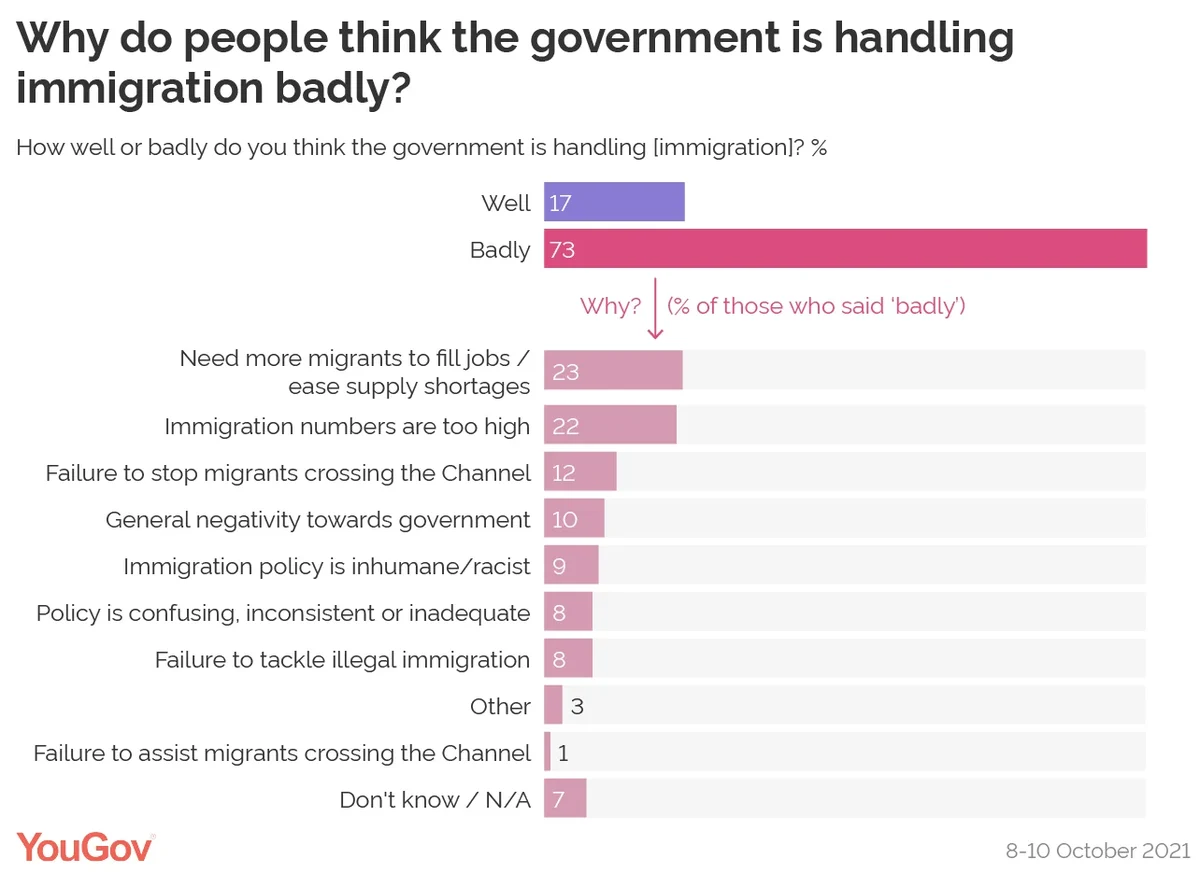According to YouGov’s ‘most important issues’ tracker, immigration is once again among the top priority issues for the British public. Currently, 23% of Brits have ‘immigration and asylum’ in their top three most important issues facing the country today. This reached as high as 35% in August (overtaking the environment in the process), while in February this year the figure was as low as 15%.
Meanwhile, views on the government’s handling of immigration as a policy issue have also been on the move, with the public increasingly unimpressed at Boris Johnson’s handling of this controversial subject. Dissatisfaction with the government is very high, with 71% of Brits in our latest poll indicating they believe Johnson’s government are handling immigration badly. That figure has now been at 70% or above since late July.
But what is it precisely that Britons are concerned about regarding immigration? Does an increase in issue importance and increasingly negative view of the government’s track record mean that Brits want to see reductions in immigration and asylum? Or have recent stories of shortages in goods, labour, and fuel caused a rise in concern that the government’s immigration policy is too restrictive?
Despite some very high profile events in recent years, public attitudes toward immigration numbers have remained fairly steady. Currently, around half of Britons (50%) say migrant numbers over the last 10 years have been too high. One in ten (10%) say numbers are too low, which is a small but notable increase on attitudes for most of the last two years. One in four (25%) consider immigration levels over the past decade to have been “about right”.
So it is clear that Brits do not want to see more immigration in general, but there is no evidence that rising dissatisfaction with government handling of immigration and rising concern with immigration and asylum as a policy is being caused by an increasing desire to see the number of foreigners entering Britain reduced. If anything, the opposite mood is growing.
What do Brits think about specific cases or types of immigration and asylum – are there any clues in the details about what is driving concern and dissatisfaction?
With well documented problems surrounding supply of food, petrol and diesel, seasonal labour issues being linked to Brexit and the Covid-19 pandemic, and the recent crisis in Afghanistan hitting headlines across the world, YouGov has asked the public a range of questions over recent weeks about their specific concerns about immigration and asylum.
On the topic of asylum, our data shows that half of Britons (51%) support the resettlement of at least ‘a few thousand’ Afghan refugees in Britain, including one in three (32%) who believe at least ‘a few tens of thousands’ should be allowed to come and 9% who support the resettlement of ‘a few hundreds of thousands’. Just 13% believe no Afghan refugees should be welcomed into the UK.
We also asked the British public if they would support a government programme aimed to filling UK job shortages with immigrant workers. A majority (51%) suggested they would indeed support such a policy, with one in four (24%) opposed.
Furthermore, we also found that the public tends to have positive views of migrants coming to the UK to work (by a margin of 41% positive to 27% negative), reunite with their families (40% positive versus 22% negative), or to set up businesses (51% positive versus 13% negative).
On the other hand, the British public do not have a favourable view of those crossing the English Channel to get to the UK. By a margin of 56% to 19%, Britons take a negative view of those arriving in this way, demonstrating a clear distinction in the public eye regarding the circumstances by which migrants arrive in the UK.*
Finally, earlier this month we asked respondents who told us they thought the government was handling immigration badly why – in their own words – they thought this was the case.
Of those who think that Boris Johnson’s government are doing badly on immigration, about one in four (23%) told us that they thought that because of ongoing problems with supply chains, food shortages, and the fuel crisis. A further 8% suggested that the government’s immigration policy was incompetent (simply not working), without mentioning the above issues.
Around one in five (22%) suggested that the government should be doing more to reduce immigration. One in eight (12%) mentioned the ongoing English Channel refugee crisis in negative terms, while a similar proportion (9%) suggested that the government’s currently policy on immigration was inhumane, discriminatory, or unfair.

Elsewhere, 10% framed their response in terms of general negativity toward the government and their policymaking. Another 8% suggested their problems were with illegal immigration.
The data suggests that while issues surrounding immigration and asylum, and the government’s handling of them, have taken on a greater importance to the public recently, it is not necessarily the case that this is driven by a desire to see less immigration or to prevent more people arriving on Britain’s shores.
It rather suggests that topical news items around asylum and the impact of lack of migrant labour on the British economy is causing concern among the public that the government is not striking the balance – or gauging the public mood on allowing foreign citizens to come and live and work in the UK – correctly.
*Note that responses do not change if we ask the public about refugees or migrants crossing the channel. When we repeated the same question but switched the wording to ask “For each of the following groups of people, please indicate if, generally speaking, you have a positive or negative view: Refugees crossing the English channel to get to the UK”, we found 59% ‘negative’ and 17% ‘positive’.
See results in the following tables:
Wording test: attitudes when referred to as... migrants / refugees











